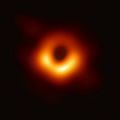Black hole information paradox facts for kids
The black hole information paradox is a puzzling idea in astrophysics. It happens when two big ideas in physics, quantum mechanics and general relativity, seem to disagree.
This paradox suggests that when something falls into a black hole, the detailed information about it might be lost forever. For example, if you threw a book into a black hole, the black hole would only "remember" its mass, how fast it was spinning (its spin), and its charge. But all the specific words and pictures in the book, which is its "information," would seem to vanish.
The problem is that quantum mechanics, which is the science of very tiny things, says that information can never truly be lost. It can change form, but it can't just disappear. This disagreement between what black holes seem to do and what quantum mechanics says is why it's called a paradox. Scientists are still trying to figure out how to solve it!
Contents
What is a Black Hole?
A black hole is a region in spacetime where gravity is incredibly strong. It's so strong that nothing, not even light, can escape once it crosses a certain point. This point is called the event horizon. Imagine it like a cosmic one-way door.
How Do Black Holes Form?
Most black holes form from the remains of very massive stars. When a huge star runs out of fuel, it collapses inward under its own gravity. If the star is big enough, this collapse can create a black hole. There are also supermassive black holes, which are millions or even billions of times more massive than our Sun. These are found at the centers of most galaxies, including our own Milky Way.
Understanding Information in Physics
In physics, "information" isn't just about facts or data like on a computer. It's about the exact state of every tiny particle that makes up an object. If you know the position, speed, and type of every particle, you have all the information about that object.
Why is Information Important?
The laws of quantum mechanics say that if you know the current state of a system, you can always figure out its past and predict its future. This is because information is conserved. It's like if you burn a piece of paper; the information isn't gone, it's just spread out in the smoke and ash. In theory, if you could collect all the smoke and ash particles, you could reconstruct the paper. The black hole information paradox challenges this fundamental idea.
The Paradox Explained
When an object falls into a black hole, it crosses the event horizon. From our point of view outside the black hole, the object seems to disappear. The black hole then only has a few basic properties: its mass, spin, and charge. All the unique details, or "information," about what fell in seem to be lost.
Hawking Radiation and the Problem
In the 1970s, physicist Stephen Hawking discovered that black holes aren't completely "black." They slowly leak out a tiny bit of radiation, now called Hawking radiation. This radiation comes from near the event horizon. Over an incredibly long time, a black hole can actually evaporate completely due to this radiation.
The problem is, if a black hole evaporates, and it only emits simple Hawking radiation that doesn't carry any of the original object's information, then where did the information go? If the black hole disappears, and the information is truly gone, it breaks the rules of quantum mechanics.
Possible Solutions to the Paradox
Scientists have proposed several ideas to solve the black hole information paradox. None of them are fully proven yet, and it's an active area of research.
Information is Not Lost
One idea is that the information is not truly lost. It might be encoded in some subtle way in the Hawking radiation, or perhaps it stays on the event horizon itself. Some theories suggest that the information might be stored in a "holographic" way, similar to how a 3D image is stored on a 2D surface.
New Physics is Needed
Another possibility is that our understanding of physics needs to change. Maybe the rules of quantum mechanics or general relativity aren't quite right when it comes to the extreme conditions inside a black hole. This could lead to entirely new theories about how the universe works.
Information is Lost (But How?)
A less popular idea is that information actually *is* lost in black holes. If this were true, it would mean a fundamental change to quantum mechanics. Most physicists find this hard to accept because information conservation is a very strong principle.
Why is This Important?
The black hole information paradox is important because it forces scientists to think deeply about how gravity and quantum mechanics fit together. These two theories are incredibly successful in their own areas, but they don't easily combine. Solving this paradox could lead to a "theory of everything" that explains all the forces in the universe. It helps us understand the most extreme objects in space and the very nature of reality itself.
Images for kids
-
The first image (silhouette or shadow) of a black hole, taken of the supermassive black hole in M87 with the Event Horizon Telescope, released in April 2019.
See also
 In Spanish: Paradoja de la pérdida de información en agujeros negros para niños
In Spanish: Paradoja de la pérdida de información en agujeros negros para niños
 | Anna J. Cooper |
 | Mary McLeod Bethune |
 | Lillie Mae Bradford |



